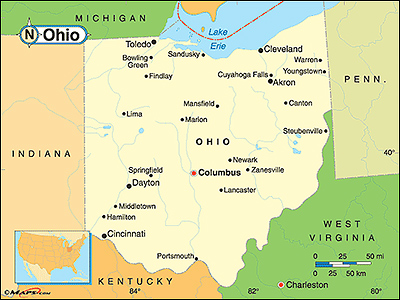
Ohio redistricting map in question (click on map above or here to go to FiveThirtyEight’s interactive map)
By Jim Ellis
April 18, 2022 — We’re on the threshold of entering the final two weeks before the Ohio primary on May 3, and the candidates for all offices are swinging into high gear just as the state Supreme Court rejected another set of redistricting maps.
The state House of Representatives and Senate primaries having been postponed, because the legislature and state Supreme Court cannot find common ground pertaining to the new district lines; no new primary date has been set. Late last week, for the fourth time, the judicial body rejected the legislature’s draw for their own political boundaries in both chambers. Since the Ohio Constitution does not give the courts the authority to draw maps, all the justices can do is return the plans to the legislature and order them to begin yet again.
News is occurring in the races that are headed toward nominations. The new Remington Research Group US Senate GOP primary survey (April 11-12; 884 likely Ohio Republican primary voters, interactive voice response system) finds former state treasurer, Josh Mandel, forging back into the lead and state Sen. Matt Dolan (R-Chagrin Falls), a minority owner of the Cleveland Guardians MLB franchise, moving into contention.
The statewide GOP primary ballot test finds Mandel leading the pack with 23 percent as compared to businessman Mike Gibbons’ 17 percent, Sen. Dolan’s 15 percent, former Ohio Republican Party chair Jane Timken posting 12 percent, and author J.D. Vance trailing at 10 percent.
Reports suggest that an endorsement coming for Vance from former President Donald Trump is imminent. If so, the polling standings will change. Remington posed a second ballot test question to the current respondent pool asking how they would vote if knowing Trump had endorsed Vance. While Mandel would still lead, his edge shrinks to 19 percent; Gibbons, Dolan, and Vance would bunch together at 15 percent; and Timken drops to 11 percent.
If the reports of Trump endorsing Vance prove true, the Remington poll suggests that such a move would likely change the race’s flow. The Trump involvement in such a manner appears to make a close contest even closer.
The Remington survey is the tenth poll taken of the Republican Senate primary since the beginning of February. Gibbons has led in six of them and Mandel three, with one showing a three-way tie among the two aforementioned men and Vance. The fact that all five of the key candidates, at one time or another, have been within shouting distance of the lead suggests that any one of them could catch a flyer at the end and propel themselves into a nomination victory with a small plurality.
On the Democratic side, US Rep. Tim Ryan (D-Warren/Youngstown) appears to be cruising toward an easy nomination victory against former Consumer Financial Protection Bureau official and 2020 failed congressional candidate Morgan Harper.





